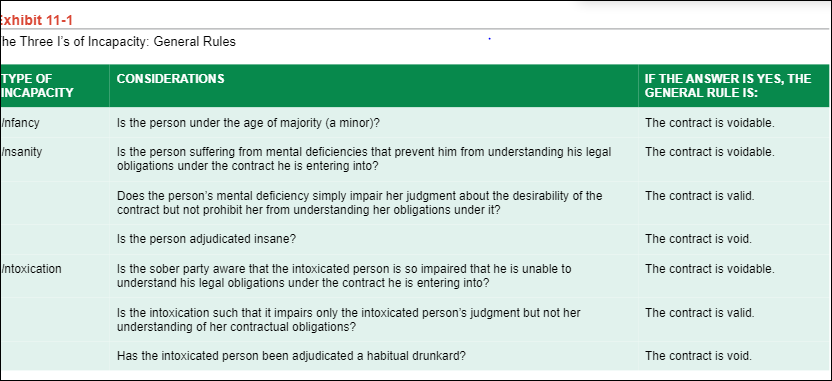Contract Scenario Calvin had been an avid coin collector for many years, and the most valuable coin in his collection was an uncirculated, mint condition, 1943 Lincoln penny made of copper (most pe

page 239
Intoxicated Persons
For purposes of determining capacity, intoxicated persons include those under the influence of alcohol or drugs. There is some variation among states in the treatment of the capacity of intoxicated persons to enter into contracts. As a general rule, most states follow the Restatement of Contracts, Section 16, which provides that contracts of an intoxicated person are voidable by the intoxicated person if the other party had reason to know that because of the intoxicated person’s condition, that person was unable to understand the nature and consequences of the transaction or was unable to act in a reasonable manner in relation to the transaction. If the intoxication merely causes someone to exercise poor judgment, the person’s capacity to enter into a legally binding contract is not affected.
Likewise, if one party has no way of knowing that the other was intoxicated at the time the agreement was made, and the agreement is a fair one, it will be upheld by most courts. For example, Lisa emails Rob and offers to buy his antique car from him for $8,000. Rob has just broken up with his girlfriend and has been drinking nonstop all day. He gets the email message and immediately responds in the affirmative. Lisa had no way of knowing Rob was intoxicated, so they would have a valid contract in most states.
Once sober, the intoxicant has the ability either to ratify or disaffirm the contract. Because public policy does not favor intoxication, the courts tend to be unsympathetic to intoxicants and will fairly liberally interpret behavior that seems like ratification as ratifying the contract. If Jim became intoxicated at a bar one evening, and Randi took advantage of the situation by getting him to sign a contract to sell her his 2004 SUV for $8,000, any act Jim takes consistent with ratification after becoming sober will result in a binding contract. If Randi appears at his house the next morning with the cash, shows him the contract drafted on a napkin that he signed, and asks for the keys and the title, then by giving her the keys and saying, “I knew I shouldn’t have drunk that much,” Jim has entered into a binding contract.
If the contract is disaffirmed on the basis of intoxication, each party to the contract must return the other to the condition she or he was in at the time the contract was entered into. Also, as with contracts of persons who have limited capacity, a contract of an intoxicated person for necessaries will be enforced for the reasonable value of the necessaries.



